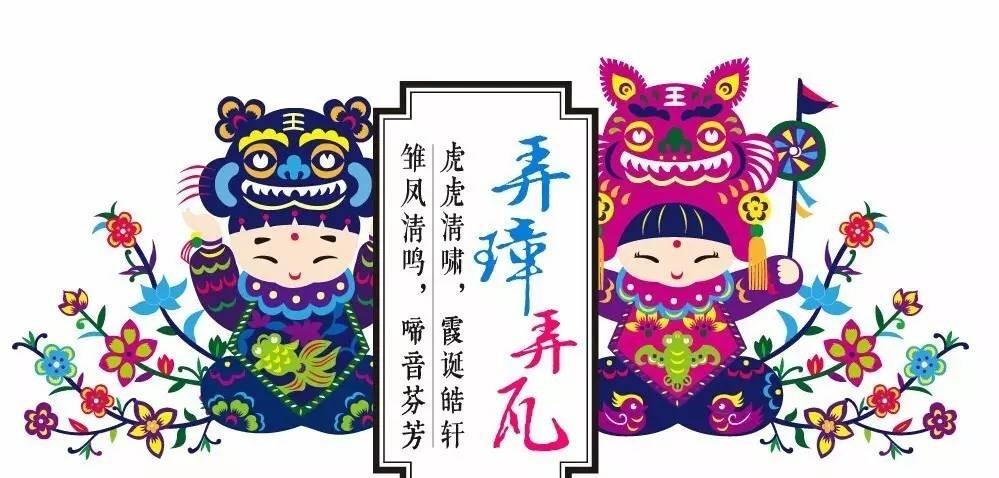When the ancients congratulated relatives and friends on the joy of your son, they did not directly explain it, and often expressed it as "the joy of Making Zhang"; when congratulating the joy of winning thousands of gold, they did not directly explain it, and often replaced it with "the joy of making tiles". And when a couple of relatives and friends give birth to a son and a daughter at the same time, they do not directly explain, and often send congratulations of "Zhangwa Tongxi". This is "Zhang" and "tile", what does it mean?

"Zhang", an ancient jade. In the Shuowen Jiezi, it is recorded: "Zhang, 剡 [yǎn] is Gui, and half Gui is Zhang." "It means a straight flaky jade with a sharp upper part and a straight lower end, divided in half longitudinally, shaped like a half gui. Zhang, not only a kind of jade, but also a noble ceremonial instrument. The Confucian classic Book of Rites is dedicated to the ritual system, and one of the chapters is called "Sacrifice System", which refers to the rituals during sacrifices, which records: "Emperor Dazong Zhizhang." "In the ancient patriarchal system, the eldest of the families was called the Emperor. Therefore, at the time of sacrifice, only the highest-ranking emperor can hold the zhang, which shows the high status of the zhang as a ceremonial instrument.
"Make six vessels of jade, and honor the heavens and the earth in all directions." Li Tian with Cang Bi; Huang Qi Li Di; Qing Gui Li East; Chi Zhang Li South; White Tiger Li West; Xuan Huang Li North" - Zhou Li
As one of the ceremonial instruments, the zhang is also a symbol of power. In ancient times, the soldier rune used to dispatch troops was also called Yazhang. With the tooth in hand, you can give orders. As long as the two teeth are combined, you can use soldiers.
Therefore, to let the boys play with Yuzhang is to hope that the children will have jade-like virtues when they grow up, and it is the ardent desire of adults to be called the material of the children.
As for "tiles", it does not refer to the tiles on the roof, as explained in the Mao Biography, which notes the Book of Poetry: "Tiles, spinning [tuán] also." It means a spindle made of pottery, and because the material is pottery like tiles, it is called "tiles."
In ancient times, in addition to the daily busy housework, women also used looms to weave cloth to supplement the family. Therefore, giving the tiles to the girl to play with is to hope that she will be skillful in her mind and can master the weaving tools when she grows up, and become a good wife and mother. It is a good wish from adults to girls.
The two allusions of "the joy of Langzhang" and "the joy of Nonghua" are from the earliest poetry collection in China, the Book of Poetry. In the Book of Verses, Xiaoya Sigan, it is written: "A man who is born, carries the bed of sleep." Carrying clothes, carrying the Zhang. His weeping cry, Zhu Fu [fú] (the knee of the big red on ancient clothes) Si Emperor, the king of the chamber family. It is a woman who is born and carries the place of sleep. Tì (bedding wrapped around the baby), the tile of the carrier. There is nothing but etiquette, only wine and food, no parents to curse [yí lí] (bring sorrow). ”
Meaning: Bless you, if you have a son, put it on the bed, put him in beautiful clothes, let him play with Yuzhang, you see how loud his crying is, in the future will be put on the knees of the big red, become the pillar of my room.
If you have a daughter, you will sleep on the ground, put her on a small swaddle, let her play with the spindle made of pottery, and hope that she will not provoke right and wrong, busy washing and cooking every day, and knowing that Dali will not cause trouble for her parents.
Little boy in ancient times
Little girl in ancient times
The Book of Verses, Xiaoya Sikan, is a blessing poem,,,,,。
These two allusions are obviously a patriarchal mentality. It has been passed down to this day, and we still use it as a blessing, which is called "taking its essence and removing its dross"!